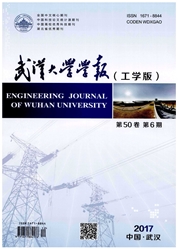

 中文摘要:
中文摘要:
为了有效地控制城市雨洪,选取武汉市汤逊湖流域作为研究区,建立一个基于D8算法的分布式城市雨洪模型,实现对城市暴雨积水动态模拟.通过对产汇流和管网排水过程进行简化,建立了流域雨洪模拟模型,并分别利用该流域2013年7月5—7日和2010年7月11-1313降雨径流资料进行模型率定及验证.与实测资料对比,模型率定期的积水总量相对误差为5.4%,典型地段积水深度相对误差均值为9.5%,绝对误差均值为18.9mm,均方根误差(RMSE)为20.0mm;验证期的典型地段积水深度相对误差均值为14.9%,RMSE为49.3mm.模拟结果表明:基于D8算法的分布式城市雨洪模型能够较好地模拟城市雨洪过程,可以进一步用于未来条件下城市雨洪情景分析,为城市雨洪控制提供决策依据.
 英文摘要:
英文摘要:
In order to effectively control urban storm water, the Tangxun Lake basin in Wuhan City is se- lected as a study area to establish a distributed urban storm water simulation model, which is based on D8 algorithm for realization of urban storm water dynamic simulation. Urban storm water simulation model of the basin is built through simplifying the processes of runoff generation, routing and drainage of pipe network; and the model is calibrated and verified using rainfall-runoff data in the basin in July 5-7, 2013 and July 11-13, 2010. Compared with measured data, the relative error of the total drainage volume is 5.4%; the averaged relative error of the maximum inundation depth in typical points is 9.5 % ; the averaged absolute error is 18.9 mm; and the root mean squared error (RMSE) is 20.0 mm in the calibration period; in the verification period, the averaged relative error of the maximum inundation depth in typical points is 14.9 G; and the RMSE is 49.3 mm. The simulation results show that the distributed urban storm water model based on D8 algorithm can be used to simulate urban storm water process satisfactorily, and can provide decision support for urban storm water control in the future through scenario analyses.
 同期刊论文项目
同期刊论文项目
 同项目期刊论文
同项目期刊论文
 期刊信息
期刊信息
